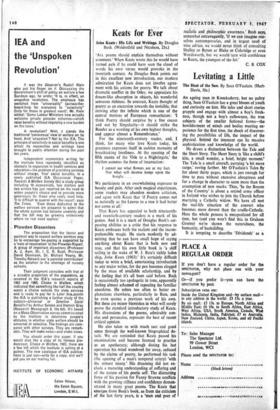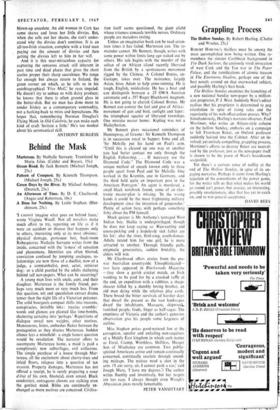Levitating a Little
The Heat of the Sun. By Sean O'Faolain. (Hart- Davis, 30s.) AN ageing man in Knockaderry, but no paltry thing, Sean O'Faolain has a great bloom of youth and curiosity on him. His tales and short stories grapple and engage with almost a boy's fresh- ness, though not a boy's callowness, the true subjects of the smaller fictional forms—the bewilderment of minds and bodies meeting ex- perience for the first time, the shock of discover- ing the possibilities of life, the impact of the physical. Behind the innocent eye lie massive sophistication and knowledge of the world.
He draws a distinction between the Tale and the Short Story. The Short Story is 'like a child's kite, a small wonder, a brief, bright moment.' The Tale is a small aircraft, carrying 'a bit more cargo,' roving farther. Mr O'Faolain's Tales fly for about thirty pages, which is just enough for time to pass without excessive abruptness and for a change in character to seem more than the assumption of new masks. Thus, 'In the Bosom of the Country' is about a retired army officer in Ireland who wishes to join the Church before marrying a Catholic widow. We have all met the real-life situation of the convert who becomes more devout than the cradle-Catholic. Here the whole process is encapsulated for all time, but (and you won't find this in Graham Greene) we're shown the naturalness, the humanity, of backsliding.
It is tempting to describe 'Dividends' as a blown-up anecdote. An old woman in Cork has some shares and loves her little divvies. But, when she sells out her shares, she can't under- stand why the divvies don't continue. It is an all-too-Irish situation, complete with a kind man paying out the amount of divvies and then getting the divvies left to him in her will. _ And it is this near-miraculous capacity for capturing the sensuous attack still inherent in past time and dead places that gives the short stories proper their sharp succulence. We range far enough but always return to Ireland, the green corner on which, as he tells us in his autobiographical `Ilive Moi!,' he rests impaled. He doesn't try to seduce us with dairy produce; he knows that there is often ground glass in the butter-dish. But no man has done more to render Irishry as a contemporary commodity, not a harking-back to mists and leprechauns. He hopes that, remembering Norman Douglas's Flying Monk in Old Calabria, he can make each kind of craft 'levitate a little.' He's too modest about his aeronautical skill.
ANTHONY BURGESS































 Previous page
Previous page